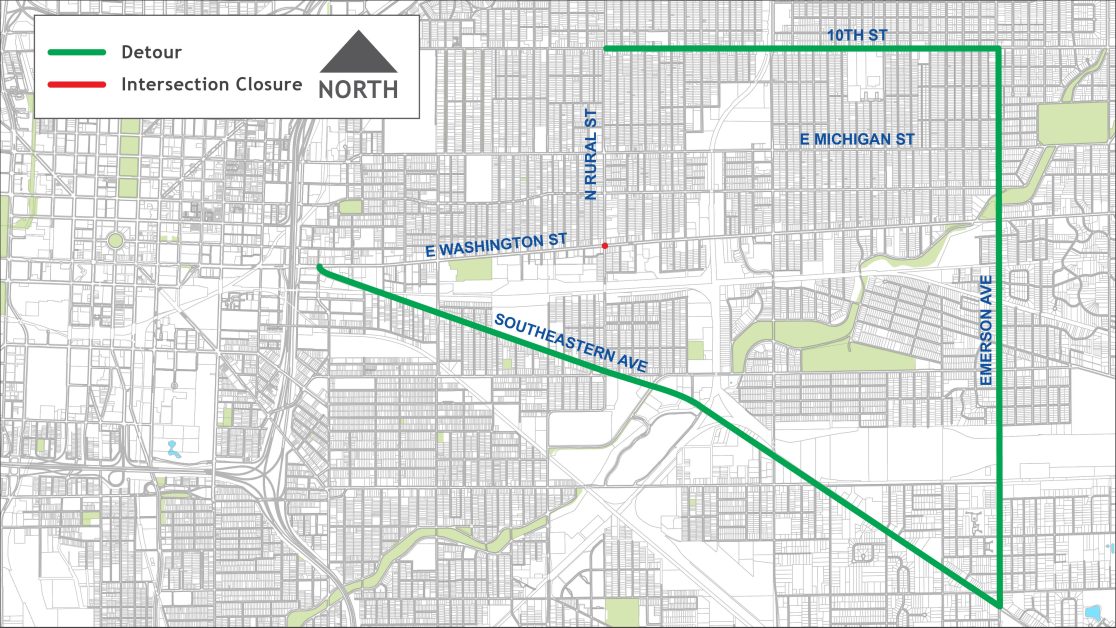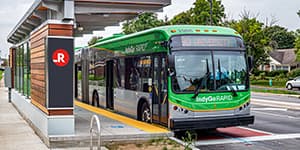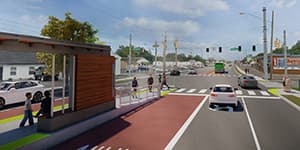INDIANAPOLIS — Beginning on or after Tuesday, May 27, Washington Street will be closed at Rural Street due to Citizens Energy Group (CEG) relocating utility lines in preparation for Blue Line construction. The utility company will also be replacing lead water pipes for property owners along the Washington Street Corridor. This work is scheduled to last approximately three weeks and will impact IndyGo’s Route 8 and Route 26.
During this closure, IndyGo buses will detour from Washington Street in both directions between State and Lasalle streets. This will result in seven eastbound stop closures and five westbound stop closures along Route 8 between State and LaSalle streets. Passengers can still access Route 8’s service at all Route 3 bus stops along Michigan and New York streets during the detour. Additionally, temporary bus stops will be placed on both State Avenue and LaSalle Street north of Washington Street. These temporary stops will serve eastbound Route 8 passengers.
Buses traveling eastbound will detour using State, New York and Lasalle streets to return back to Washington Street. Westbound service will use LaSalle, Michigan and State streets to continue along Washington Street. (See detour map and additional project information below.)
Additionally, Route 26 will detour from Washington and Rural streets between Rural and LaSalle streets. This will result in one stop closure both northbound and southbound along Rural Street, as well as three eastbound stop closures and two westbound closures along Washington Street. Passengers can still access Route 26’s service at the bus stops between Rural and LaSalle streets along the detour route using Route 3 stops on New York and Michigan streets. Outbound Route 26 passengers will also be able to use the temporary stop that will be placed on southbound LaSalle Street.
Traffic will also be detoured using Southeastern and Emerson avenues and 10th Street.
Please see below for additional information about CEG’s project:
Dec. 13, 2024 — Citizens Energy Group today announced that work will begin in January on lead service line replacements for property owners adjacent to IndyGo’s Blue Line route, a 24-mile Bus Rapid Transit corridor running east and west on Washington Street connecting downtown to the Indianapolis International Airport. Crews will replace customer-owned lead service lines for neighboring homes and buildings concurrent with standard utility line relocation work completed in preparation for road construction. Where crews work to relocate water, wastewater, or natural gas utility lines to enable the future road reconfiguration, a special team will also be switching out water service lines made of lead.
“When we find natural efficiencies like this, it’s an easy choice to make,” said Executive Director of Capital Programs & Engineering for Citizens Energy Group Sara Mamuska-Morris. “We appreciate working with IndyGo and the City of Indianapolis ahead of their construction projects to limit the amount of time roadways must be impacted—while also getting as many lead service lines as possible out of the ground for our water service customers.”
Letters from Citizens are now being mailed to impacted property owners in the central and eastern portions of the Blue Line corridor, generally between Harding Street and Shadeland Avenue, inviting participation in the Lead Service Line Replacement Program and requesting signatures on an access agreement. Eventually, the entirety of the corridor will see both utility line relocations and service line replacements for properties where lead service lines exist.
While water in the public water distribution system does not contain lead, Citizens is implementing a Lead Service Line Replacement Program, first approved in 2022, to replace all customer-owned water service lines made of lead that connect homes and buildings to public water mains. To date, the program has replaced more than 2,500 lead service lines at no direct project cost to the individual homeowners. Many homes built in Indianapolis before 1950 include service lines made of lead, a common building material used through the middle of the 20th century.
Simultaneously completing replacements and utility line relocations otherwise required by roadway improvement projects is just one strategy for program efficiency. Citizens also performs replacements alongside utility maintenance projects and in proactive focus areas in neighborhoods such as Martindale Brightwood that include high numbers of lead service lines.
This new wave of replacements comes on the heels of a recent, large-scale communications campaign in which Citizens published a public inventory of all customers’ service lines and their material make-up. In October and November, the utility also mailed the first of what will be annual notifications to all customers who own service lines confirmed to be made of lead or whose makeup is unknown. The annual notification informs homeowners about the makeup of their service line and also provides information about how to request free water testing and how to mitigate lead exposure in drinking water, as well as information about the Lead Service Line Replacement Program.
About the lead service line replacement program being implemented by Citizens Energy Group
Tens of thousands of Citizens customers own homes or buildings that include a customer-owned water service line made of lead or containing lead (particularly structures built before 1950). Approved in 2022, the multi-year lead service line replacement program is identifying customer-owned service lines that contain lead and replacing them.
Citizens regularly monitors tap water throughout the public system and at points within customers’ homes in accordance with United States Environmental Protection Agency’s Lead and Copper Rule. Drinking water remains fully compliant with all federal and state water quality requirements. Still, the surest method to avoid any potential for lead exposure in drinking water is to replace customer-owned service lines made of lead. Replacements will be accomplished in several ways: in coordination with infrastructure improvement projects; in proactive focus neighborhoods; or as initiated by customers for the upgrade or maintenance of their own service line.
Learn more about the lead service line replacement program Citizens is implementing by clicking here.
###







